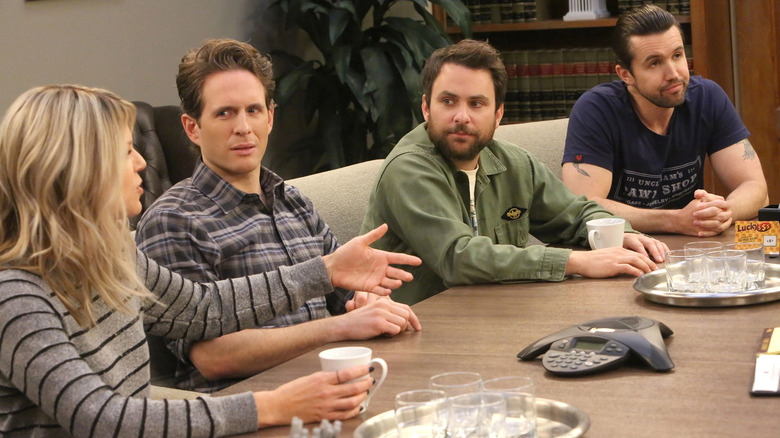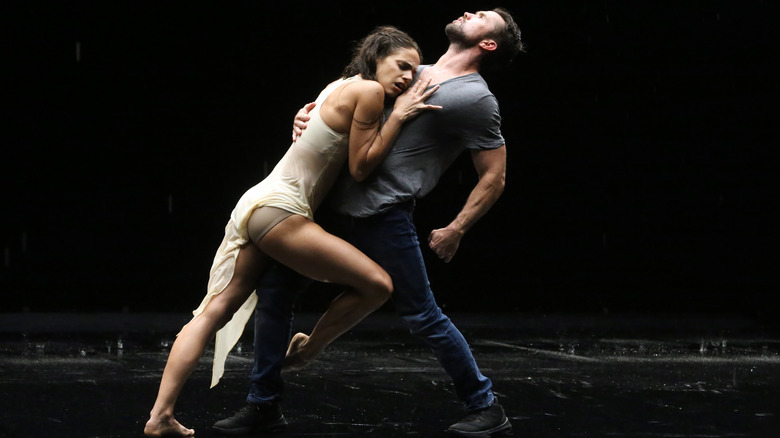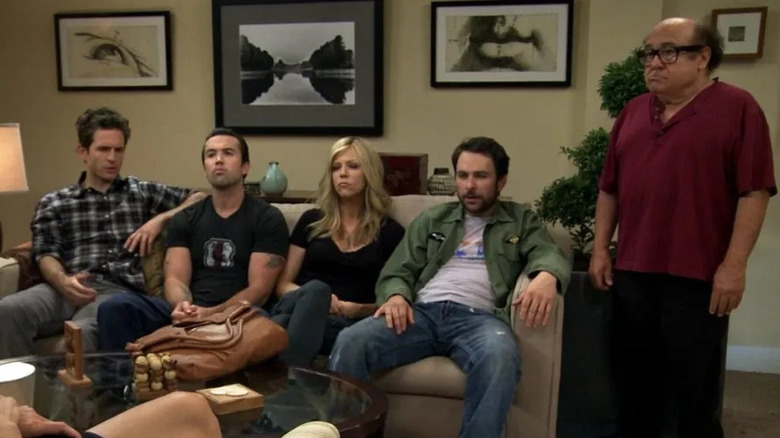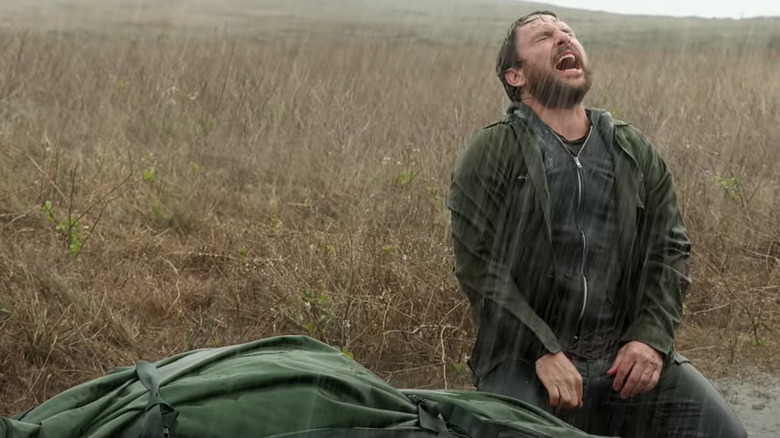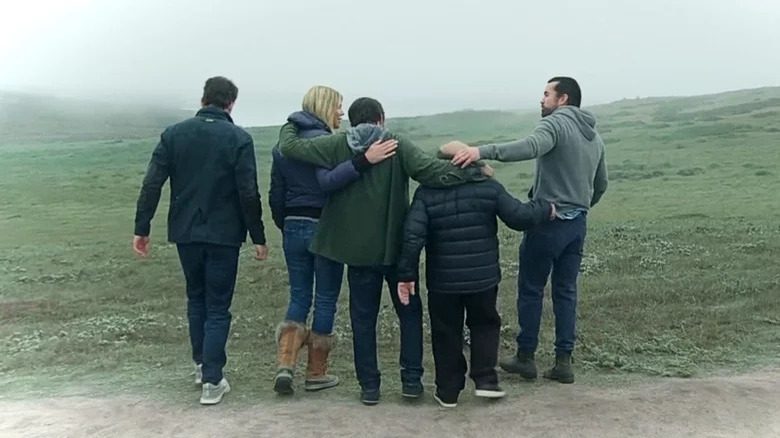It's Always Sunny Isn't Just A Show About Terrible People
Sitcoms frequently revolve around truly terrible people. The format requires ridiculous situations in order to work (that's where the "sit" in sitcom comes from), and well-adjusted people would usually take care of the situations reasonably, if they ended up in them at all. Larry David upped the bar on sitcom characters being awful with "Seinfeld" and "Curb Your Enthusiasm," forever changing the TV comedy landscape. His characters were unapologetically selfish and often rude, inspiring shows like "Friends," "The League," and "It's Always Sunny in Philadelphia." The creators of "It's Always Sunny" have been open about their "Seinfeld" inspiration, even having the characters re-enact a scene from the famous episode "The Contest" during a riff on clip shows. While people are horrible on other shows, the gang on "It's Always Sunny" are notoriously among the worst, but fans still love these characters. After 16 seasons the show is still going strong, which begs the question — how do people not get sick of the gang being monsters?
Fans can find basic comfort in the fact that the gang never, ever wins, but there's something surprising lurking within the dark heart of the show: earnestness. Every rare once in a while, the characters get a chance to be very real, relatable human beings. We get a chance to understand why they're monsters, and though the show never condones their behavior, it at least doesn't feel totally random. There's something weirdly lovable about the gang, and their damaged humanity plays a huge role.
Moments of real vulnerability
Occasionally the members of the gang get a chance to be really vulnerable to one another and the audience, and there's no greater example than "Mac Finds His Pride." The season 13 finale is an emotional gut-punch, following Mac (Rob McElhenney) and his semi-adoptive father figure Frank (Danny DeVito) as they try to help the freshly out-of-the-closet Mac find his gay pride. The ridiculous adventure through gay subcultures ends with Mac performing an impassioned dance for his actual, imprisoned father (and Frank and the rest of the prisoners) with ballerina Kylie Shea. The dance is beautiful and heartbreaking, and lets Mac be profoundly raw. The dance doesn't do anything for Mac's dad, who storms out, but Frank finally understands, uttering, "I get it," as tears fill his eyes.
These aren't people who really ever open up and actually find pride in their ability to give and receive emotional abuse, but two of its most disparate characters managed to make a real connection. There is real love between members of the gang that holds them together, but they're all too broken to know how to show it. We get glimpses, like Dennis (Glenn Howerton) kissing Frank's bald head during a bonding moment in Ireland, but they're exceptionally rare. Like many other sitcoms, earnestness is a sign of weakness, but "Always Sunny" actually lets its characters go there.
The gang are deeply damaged people
Throughout the series, we have gotten glimpses into the gang's pasts, going all the way back to their childhoods. Charlie (Charlie Day) and Mac grew up poor, the former raised by a mentally ill alcoholic sex worker and the latter by a semi-absentee criminal father and a completely checked-out mother. Dennis and his twin sister Dee (Kaitlin Olson) were wealthy but neglected, raised by a narcissistic mother and Frank, who psychologically abused the kids with the idea of making them learn harsh life lessons. Frank himself was sent to a mental health facility as a young child and was traumatized by being chased with a net by the doctors, though we don't know much about his parents. The gang have all suffered some kind of trauma in their lives and have never once dealt with it, even rejecting the idea that they have trauma or mental health issues when confronted with them.
And they are confronted with them. The series doesn't let the gang exist entirely in a bubble, and when they interact with the outside world, their deranged behavior is challenged. Mental health professionals have even given diagnoses that go ignored, like Dennis being diagnosed with borderline personality disorder in the season 10 episode "Psycho Pete Returns," though he denies that he could have BPD and never takes the prescribed medicine. In the season 9 episode "The Gang Gets Quarantined," they all finally realize they're alcoholics and decide to take that information and "shove it down." They're all tragic characters who are in complete denial, seeing themselves as the triumphant heroes of their own stories.
The king of the rats
The most tragic character in the gang is Charlie, whose life was absolutely horrific from an early age and never really let up. His mother, Bonnie (Lynne Marie Stewart), has an obsessive disorder where she has to do things in threes ("Or Charlie will die," she tells Mac) and germophobia, creating suits for she and Charlie to leave the house during a flu outbreak. She's also a serious alcoholic, having rigged her suit with a beer straw so she didn't ever have to go without. Bonnie loves Charlie, but left him to his own devices more often than not as a young child, which led to him huffing glue and likely causing brain damage. Said brain damage is also possibly why he started the series semi-literate and descended into writing in homemade hieroglyphics, as the huffing never stopped. He was also very likely molested by his uncle Jack (Andrew Friedman), writing a song and later a musical about the experiences.
In the bar where they all work, Paddy's Pub, any work that's deemed below the rest of the gang is "Charlie work." He serves as janitor and exterminator, keeping the bar's most basic needs met without ever getting thanked for it. He's the glue that holds the bar, the gang, and the series together, giving it something resembling a beating human heart. He even gets his own moment of drama and catharsis a'la Mac's dance in the season 15 episode "The Gang Carries a Corpse Up a Mountain," crying out for his dead, absentee father. In the end he's rescued from the situation by the gang in a somewhat heartwarming moment that reminds us that the gang are a (seriously messed-up) family.
Nihilistic comedy with just a touch of empathy
Charlie's moment of vulnerability is a great encapsulation of the way the show balances beating down the members of the gang with occasional moments of empathy for them as people. When asked by /Film about filming Charlie's big breakdown in the rain, Day summed it up perfectly:
"I think it was really cathartic for me as well, just as a person and a performer, just to let that out. And it was nice to do in terms of the story to just acknowledge the character's humanity just for a minute. I think audiences wouldn't love it if we dwelled on it forever and ever, but to stomp down the insanity for a minute and say, hey, let's just take a look at this guy. He's a real guy who's had a very messed up life and that might explain a little bit why he is who he is. It's not a justification, but it's just another color."
"It's Always Sunny in Philadelphia" never tries to justify the gang's awfulness, but every once in a while we get to see them on a human level. Sitcoms are frequently also hangout shows, providing a sort of friend group through entertainment, and these little tidbits of humanity give them real depth that elevates them above their cartoonish antics. They may be some seriously f***ed-up family, but they're our seriously f***ed-up family, and "It's Always Sunny" fans wouldn't trade them for the world.
